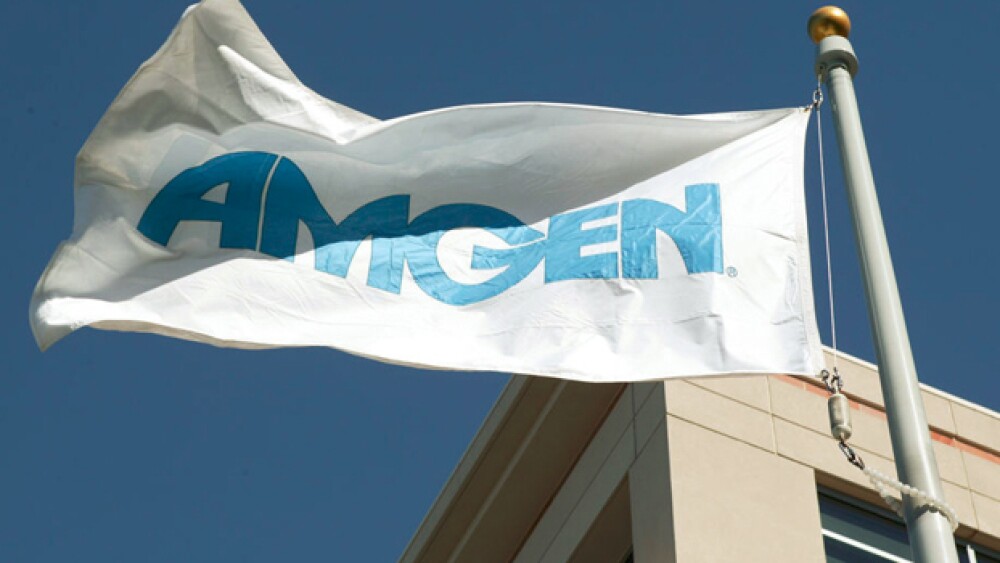Thousand Oaks-based Amgen will reduce the price of its anti-cholesterol drug Repatha by 60 percent to $5,850 per year as part of a move to improve affordability by lowering patient copays, the company announced Wednesday.
Thousand Oaks-based Amgen will reduce the price of its anti-cholesterol drug Repatha by 60 percent to $5,850 per year as part of a move to improve affordability by lowering patient copays, the company announced Wednesday.
A PCSK9 inhibitor, Repatha is prescribed to people with high cholesterol who are at risk for heart attacks and strokes. Robert A. Bradway, chairman and chief executive officer of Amgen, said cardiovascular disease events such as stroke or heart attack affects someone in America every 40 seconds. Repatha, he said, can help to address this significant public health issue. However, Bradway noted that concerns over out-of-pocket costs have proven to be a barrier to “too many patients.”
During a conference call Wednesday afternoon, Bradway noted that more than $600 billion is spent on cardiovascular disease in the United States annually. And, he said that is likely to continue with an aging population. Bradway said incidents of heart attack or stroke going up rather than down, which indicates that the “issue will get much worse.” Repatha, Bradway said, can help mitigate some of the concerns, as the drug has been shown to be a preventative for heart attacks. But, again, he stressed that cost has proven to be a barrier for many patients, particularly those patients on Medicare Part D. About 75 percent of Medicare patients prescribed a PCSK9 inhibitor never fill the prescriptions due to the out-of-pocket costs, which could be more than $300.
“We want to make sure that every patient who needs Repatha gets Repatha. Innovation that doesn’t make its hands into patients is meaningless,” Bradway said.
During the call, the company pointed to last year’s results from the FOURIER cardiovascular outcomes study that showed adding Repatha to optimized statin therapy resulted in a statistically significant 20 percent reduction in major adverse cardiovascular events.
Repatha was approved by the U.S. Food and Drug Administration in 2015 to treat a rare genetic diseases known for high LDL-C. Its initial approval was based on clinical evidence that the drug lowered the bad cholesterol by about 60 percent and decreased the rate of cardiovascular events, including heart attack, heart failure leading to hospitalization and death, by approximately 50 percent.
Amgen said the price reduction for Repatha reflects the company’s active participation in the American Heart Association’s (AHA) Value in Healthcare Initiative. Additionally, the company noted that the reduction is part of the company’s support of the White House’s goal to lower the price of drugs for consumers. Amgen said it decided earlier this year to not move ahead with some planned price increases for its medications and it does not plan to do so for the remainder of the year. Bradway stressed that the lower priced Repatha is identical to the Repatha currently available,
During the call, Amgen said it was making Repatha available at the reduced price through the introduction of new National Drug Codes. As the company rolls out the drug at the new price, it said the SureClick version, the most commonly used delivery system, will be available at the new price beginning Thursday. Its pre-filled syringe and Pushtronex delivery systems will be available in the next two to three months. There is a question as to whether or not Medicare Part D patients will see the lowered pricing due to in-place formularies. Murdo Gordon, executive vice president of Global Commercial Operations at Amgen, said those formularies are typically addressed in the spring, but the company will make an effort to see if a change can be made before then.
Gordon said that throughout the year, the company has been offering significant rebates for Repatha, which has effectively reduced the price by about 60 percent. Despite those rebates, Gordon said that does not typically impact out-of-pocket costs for patients, particularly those on Medicare.
Express Scripts, one of the largest prescription drug benefit managers in the United States, is on board with the new pricing. In a statement, Steve Miller, chief medical officer for Express Scripts, said that with the lower list price, Amgen is “taking an important step forward payers be better positioned to provide breakthrough medicines and help people achieve better outcomes.”
As the company continues to move forward with the reduced price medication, Amgen said it will continue offering Repatha at its original list price for a period of time, with an expectation of discontinuing the original list price of Repatha by the end of 2020 or sooner as all formularies are changed to reflect the price reduction.





